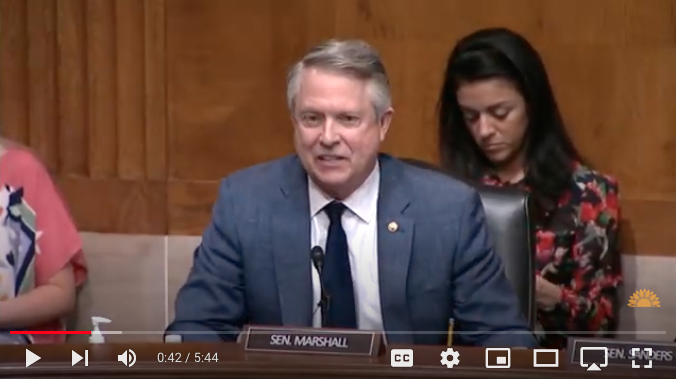- May 2, 2024
Senator Marshall Outlines Solutions for Maternal Health Crisis in Senate Committee Hearing
Washington, D.C. – U.S. Senator Roger Marshall, M.D. addressed witnesses during a Senate Health, Education, Labor, and Pensions (HELP) Committee hearing on the maternal mortality in the US.
Senator Marshall’s experience as an Obstetrician-Gynecologist who has delivered over 5,000 babies, as well as ran a rural hospital, expressed his personal experiences and the challenges within the health care industry to address maternal deaths.
In Congress, Senator Marshall has used his experience as a physician to champion numerous pieces of bipartisan legislation to improve maternal health outcomes nationwide.
Recently, the HELP Committee passed the Preventing Maternal Deaths Reauthorization Act of 2023 which would continue supporting state efforts to reduce disparities, especially for pregnant women in underserved and rural communities. The U.S. Centers for Disease Control and Prevention released a new report this month finding that maternal mortality rates decreased significantly.
You may click HERE or on the image above to watch Senator Marshall’s full questioning.
Highlights from Senator Marshall’s questioning include:
Senator Marshall, M.D.: I want to make sure everybody knows that one maternal death is too many. And yes, we need more minority doctors, nurses, the whole gamut, I totally acknowledge that. Mr. Chairman, I would suggest that the work we’ve done with community health centers will do more to impact this than all the other ideas we’re hearing about, that our vision of these community health centers would have prenatal clinics in them and then help take care of the women after the babies delivered – something as an Obstetrician, that maybe I didn’t do the best job after we got to about six weeks.
And the other thing that would impact this more is stopping the illegal crossings on our border and the fentanyl poisoning. That’s just accumulating problems from my mom’s as well.
I’m a first-generation college student, too. I went to a community college, my wife went to a community college, a community college nurse. 90% of nurses in our hospital, our community are college nurses. I went to a residency program in St. Pete, Tampa, very busy, eight residents by 5,000 deliveries a year. So, the 20,000 moms that we delivered you know how many maternal deaths we had? Zero… How come? Two things: one, we had incredible, committed doctors and nurses and ultrasound techs. But number two is I set up a prenatal clinic. When I got there a fourth, maybe half of our moms, were not getting any prenatal care. I went to a church on the wrong side of town and said can we use your basement to set up a prenatal clinic and made sure that every mom had prenatal care before they ever got to the hospital… But that was one simple solution.
So first of all, I want to thank all the hard working nurses and doctors and the people out there, the community health centers that are making a difference.
Next, what’s the most common cause of maternal death?
Dr. Lawson, President of the National Medical Association: In black women, cardiovascular disease, and Native American and Caucasian women we sometimes see mental health and substance use disorders.
Senator Marshall, M.D.: The most common cause of maternal death now is is suicide and drug overdosing, and fentanyl poisoning. Okay, that’s the number one cause. What percentage of these deaths occur more than a week after delivery?
Dr. Lawson, President of the National Medical Association: Over half, around 52%.
Senator Marshall, M.D.: So half of these deaths are occurring a week after delivery. That’s why these community health centers are so important, is to follow up on the mental health aspect, let alone the addiction issues as well. Okay, so that’s the solution to the postpartum issues. Intrapartum, number one causes now, hemorrhage, heart disease, stroke, PE, cardiomyopathy, infection, hypertension, those are the ones that we can impact with prenatal care and intrapartum care as well.
I think we have to also acknowledge why, you know, why is heart disease spiking right now, from a maternal m&m situation? Well, it’s several reasons. One is that our moms are older. Number two is they’re heavier, and number three is diabeetus. I mean, the demand of type two diabetics that I saw in my clinic doubled or tripled in my 25-year career.
So again, we go back to our community health centers, with nutrition as a component, with mental health as a component- that we hopefully have healthier moms before they get pregnant. That’s what’s going to impact all these. We don’t need to form committees and pray about it. We know the solutions. I think our community health center legislation is the best thing I see out there that’s going to touch all people, and just look forward to continuing the great work the Chairman and Ranking Member have done on these issues.

